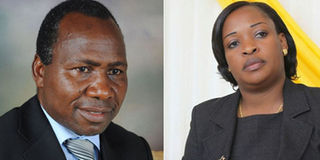Let parliament work without inteference

The Committee’s Chairman Dr Dalaly Kafumu and his deputy Ms Vicy Kamata tendered their resignation letters to the National Assembly Speaker Mr Job Ndugai as the National Assembly resumed meetings of the various committees ahead of the April opening of the budget sessions.
What you need to know:
- The Committee’s Chairman Dr Dalaly Kafumu and his deputy Ms Vicy Kamata tendered their resignation letters to the National Assembly Speaker Mr Job Ndugai as the National Assembly resumed meetings of the various committees ahead of the April opening of the budget sessions.
News on Monday of the resignation of two senior members of Parliament’s Industry, Trade and Environment Committee came as a surprise to many.
The Committee’s Chairman Dr Dalaly Kafumu and his deputy Ms Vicy Kamata tendered their resignation letters to the National Assembly Speaker Mr Job Ndugai as the National Assembly resumed meetings of the various committees ahead of the April opening of the budget sessions.
The resignations were abrupt and are likely to impact the performance of the committee, an important cog in the business of the Parliament.
Most worrying, however, is the reason Dr Dalaly Kafumu and Ms Vicky Kamata put forth for their decision to quit– interference by forces outside Parliament. To put it blatantly, they were referring to the matter of pressure reportedly brought unto them by government officials who were apparently not pleased with the gusto with which the leaders took their assignment.
In the corridors of Parliament during the last meeting, it was not uncommon to hear complaints against some government officials who were said to unduly interfere with the work of some of the committees’ leaders. MPs openly lamented some of their colleagues had been labeled ‘traitors’ for seeking to do their work as Parliamentary democracy dictated. Afterall, Bunge is an independent organ of the state and must be seen to live by that spirit. Dr Kafumu and Ms Kamata’s resignations thus are an unfortunate development that proves beyond doubt that there is an uncalled for effort by the executive to either influence or armtwist Parliament to serve at its whim and not as an independent people’s watchdog.
Political scientists insist on the principle of the separation of powers for effective governance of a state. It is on this basis that the state is divided into branches, each with separate and independent powers and areas of responsibility so that the powers of one branch are not in conflict with the powers associated with the other branches. The typical division of branches is into a legislature, an executive and a judiciary.
They further argue that the aim is to prevent the concentration of power and provide for checks and balances.
In light of the above, Dr Kafumu and Ms Kamata were right to take the steps that they took. They would come across as honest servants who did not want to betray their conscience. They want to demonstrate that leaders can stand for and protect something they believe in. A principled leadership is something that is dearly lacking among many of our leaders.
If we are therefore to believe these two leaders, it is disconcerting that such exposed interference could erode the checks and balances as we know them.
When it gets to that point, the welfare of the entire state is in jeopardy because accountability ceases to exist, rule of law remains only a theory and good governance has no place.
For the nation to prosper, the principle of checks and balances is a key pillar. The legislature has powers to make laws and at the same time supervise the executive, while the judiciary is left with the functions of interpreting laws and administering justice.
It is for this reason that we call upon all those in positions of power to abide by the country’s constitution that clearly explains the functions of each pillar of the state.




